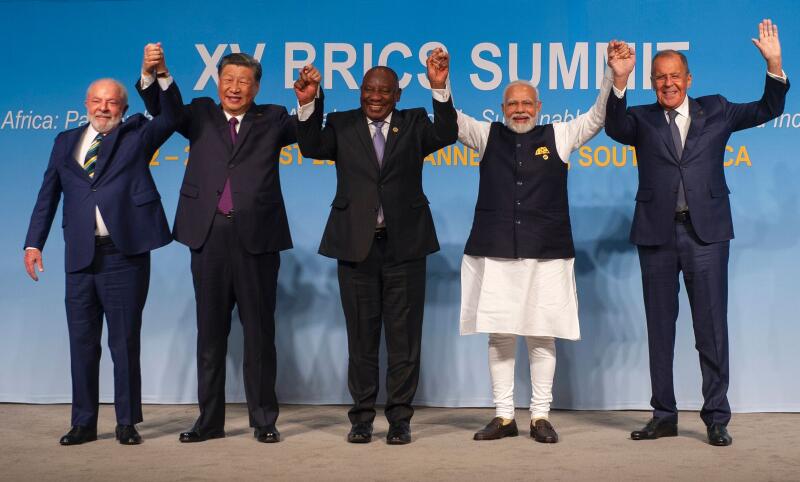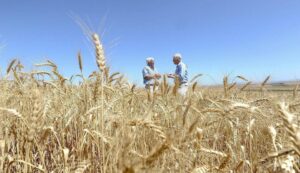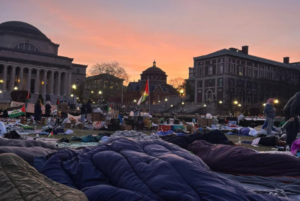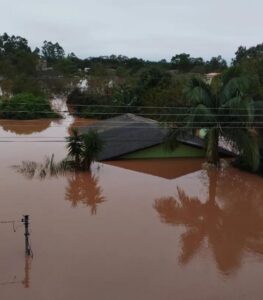Picture: ALET PRETORIUS/POOL/AFP) – Brazil’s President Luiz Inacio Lula da Silva, China’s President Xi Jinping, South African President Cyril Ramaphosa, Indian Prime Minister Narendra Modi and Russia’s Foreign Minister Sergei Lavrov raise their arms as they pose for a group photograph, at the BRICS Summit in Johannesburg on August 23, 2023.
By Dr André Thomashausen
In September 2004 the foreign ministers of Brazil, Russia, India and China agreed to have regular consultations. Little did they imagine that 19 years later, they would be the driving forces of a new global alliance of 11 nations. In January 2024, the BRICS will expand and add Argentina, Egypt, Ethiopia, Iran, Saudi Arabia and the United Arab Emirates to the original four constituent members, South Africa having joined as the 5th member in 2010. The 11 member states, BRICS Plus, will represent 37% of the World GDP and 46% of the world population. The BRICS Plus are larger and carry greater weight than any other regional alliance.
The BRICS Heads of State summit meeting on August 22-24 in Johannesburg consolidated the nature of the BRICS as a collaborative forum. The Johannesburg summit did not convert the BRICS into a formal international organisation with an own legal personality, secretariat and founding treaty. Rather they will continue to operate as a Non-Formal Forum of International Co-operation (NFFIC).
The forum framework allows for the flexibility required to keep aligned 11 members with divergent national interests, traditions and political cultures. The principle of unanimity of all joint decisions and the equal respect for the sovereignty of each participant enable the alliance to continue to grow.
Before the Johannesburg summit, 23 aspirant member states had high expectations to join, other than the successful six, Algeria, Bangladesh, Bahrain, Belarus, Bolivia, Venezuela, Vietnam, Honduras, Indonesia, Cuba, Kazakhstan, Kuwait, Morocco, Nigeria, Palestine, Senegal, and Thailand. Nigeria, Bolivia and Cuba are particularly disappointed as the political affinity towards the BRICS political culture is far more evident than it is in the case of Argentina or Ethiopia.
Rather than ideology, the focus on what brought about the original common BRICS characteristics prevailed: attractiveness for foreign investment and evidence of accelerating development and modernisation. Ethiopia, home to the AU, to globally successful Ethiopian Airlines and Africa’s most enterprising rail projects, fits those criteria better than Bolivia, Cuba or Nigeria. Growth, development and international respect are the essential ingredients of the BRICS proposition.
Aspirant members that were not invited will be considered for association or membership at forthcoming summits.
South Africa emerges as the clear winner of the 2023 summit.
South Africa was praised by everyone for an exemplary organisation of the event, having managed to receive over 50 Heads of State and Governments at three different airports with red carpets, warm African traditional welcoming performances and full protocol transport to many different hotel locations.
No mishaps or security threats overshadowed the proceedings. Even First World observers lauded the state-of-the-art conduct of proceedings, interlaced with displays of prime entertainment and culture. The Department of International Relations and Cooperation and its Minister Naledi Pandor deserve nothing but admiration and compliments.
The “15th BRICS summit Johannesburg II Declaration” lists 94 Consensus Items, over a length of 26 pages. It is a formal international policy document of the highest quality, consistent, focused and authoritative.
It is also a document that can be regarded as a kind of rebellion against Western international legal traditions and institutions.
The Johannesburg II Declaration demands in point 20, disarmament and non-proliferation of nuclear, biological and chemical weapons, including in Outer Space. This stance is taken in direct opposition to the immense re-armament commitments by industrialised nations, for instance Germany and Japan each having assigned more than $300 billion for the purchase of new weapons system, and Australia committing to become a nuclear weapons state.
Point 7 unequivocally demands the comprehensive reform of the United Nations system to ensure fair representation of the developing nations. Point 8 calls for the end of trade marginalisation and the reform of the World Trade Organization system. Point 10 demands a review of the current International Monetary Fund quota system by December 15. The quota system as it stands, ensures the decision-making prerogative of the US within the IMF.
It was clear during the Johannesburg Summit that the BRICS members would like to see an end to the Ukraine conflict rather sooner than later, however, Russia’s self-defence justification was not rejected, contrary to expectations by NATO diehards and their voices in South Africa.
Point 19 on Ukraine, rejects the maximalist (all or nothing) positions of NATO and its allies that refuse to consider root causes. The Johannesburg II Declaration calls for unconditional mediation and dialogue and support for the ongoing African Leaders Peace Mission.
“Mutually Accelerated Growth” is the positively forward-looking theme in the Johannesburg II Declaration. It highlights the future expansion of the New Development Bank (the BRICS Bank), BRICS Contingent Reserve Arrangement (CRA), and the BRICS Payment Task Force.
The proposition of a BRICS common currency was referred to further study and consultations. A surprise intervention by Standard Bank Group CEO Sim Tshabalala at the commencement of the first Summit plenary session poured cold water on the hopes for a common BRICS currency. Standard Bank, despite its substantial Chinese shareholding, has a long tradition of defending the policies of the big London based financial industries. “De-dollarisation” is an anathema in those circles.
Tshabalala himself, very shortly before the BRICS summit, tried to silence South Africa’s 2nd largest media group by attempting to exclude them for all and any banking services. The pretext for this interference with the freedom of information was that they (the Independent Media Group) constituted an unacceptable reputational risk for the bank.
Tshabalala’s argument that a common currency cannot function between states with vastly different income, tax, GDP and exchange rate fluctuations, is not compelling. The common European currency Euro was successfully introduced despite vast economic, trade balance and taxation discrepancies amongst EU members.
South Africa’s greatest summit success is on the economic front. The export of important agricultural products, threatened by import bans and punitive customs tariffs in the EU, will be saved by the BRICS. In place are $5.4 billion funding for urgent infrastructure rehabilitation, $173 million for the implementation of Phase 2 of the Lesotho Highlands Water Project, crucial support agreements for green energy transformation, Eskom and the power distribution network, as well as for Transnet.
Authoritative studies predict that South Africa could rapidly attain a 5% growth rate if electricity availability and rail transport are returned to dependability in line with demand. The BRICS bloc has committed to help rehabilitate South Africa’s power grid and rail. South Africa will have to create the conditions for collaborative forms of management with the inclusion of foreign skills to be instituted.
The enthusiastic outlook for the future BRICS Plus cooperation will have to survive a wide range of divergent interests and cultures. Argentina and Brazil have been jealous competitors within the Mercosur alliance. Ethiopia and Egypt are wrestling over the shared resources of the Nile River. India and China have a long history conflicting engagements and so have Russia and China. Between India and Russia, a dispute over payments for oil supplies persists. Iran, Saudi Arabia and the UAE have been confronting each other in the Yemen conflict.
Internally, the understanding of human rights differs. Saudi Arabia and Iran impose traditional roles for women in their societies, whilst South Africa reinforces gender equality with mandatory quotas. For China, the “people centred” human rights concept must ensure social well-being for all, before individual human rights claims will be entertained. Labour takes precedent over capital in China, whilst South Africa accords the greatest protection and freedom to capital.
With the accession of Iran, Saudi Arabia, the UAE and Egypt, a powerful Islamic presence within the BRICS will come to exist. Russia and Brazil, together with Saudi Arabia, Iran and the UAE will in future make up a bloc that accounts for a total of 35% of the world’s oil production.
The collaborative BRICS culture based on shared values, historical bonds of solidarity and friendship will have to hold together an alliance of members with vastly diverging interests. Exposure to different levels of external pressure, in particular in the cases of China, Russia and Iran, will add tensions.
Chinese President Xi Jinping, in his address at the beginning of the summit, summed up the BRICS political culture with his reference to the right to development that each and every country should enjoy, without detriment to any other. A similar foundation can be seen in Russia’s postulations that one country’s security may not be sought at the expense of another country’s security interests.
Xi Jinping’s appeal to “dialogue instead of confrontation” echoes the BRICS consensus to listen rather than to judge. The BRICS Plus envision a new identity in international relations of becoming “the sea that welcomes all rivers”.
In contrast, the post WWII international order was built on compartmentalisation and exclusions. It may be that the BRICS Plus will not desire to be “anti-Western”. The Johannesburg summit nevertheless clearly challenged the old order and loudly demands an equal voice in all levels of international relations.
Dr André Thomashausen is Professor Emeritus of Comparative and International Law at Unisa




